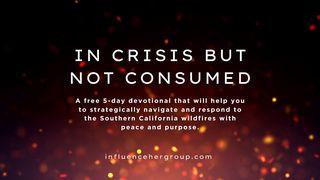Psalms: Songs of LamentSample

To Cry Is Human, to Lament Is Christian
By Jimmy Purchase
"Out of the depths I cry to you, Lord; Lord, hear my voice. Let your ears be attentive to my cry for mercy. If you, Lord, kept a record of sins, Lord, who could stand? But with you there is forgiveness, so that we can, with reverence, serve you. I wait for the Lord, my whole being waits, and in his word I put my hope. I wait for the Lord more than watchmen wait for the morning, more than watchmen wait for the morning. Israel, put your hope in the Lord, for with the Lord is unfailing love and with him is full redemption. He himself will redeem Israel from all their sins.”—Psalm 130 (NIV)
What do you think about when you hear the word lament? Often, we think of worship as joyful and celebratory! Though that’s true, there’s another aspect of Christian worship that might not seem joyful, but it is hopeful.
Would you believe me if I told you the majority of the Psalms are psalms of lament? All throughout the Psalms, we see the psalmist cry out to God for deliverance, direction, provision, and protection. Before he vocalizes these requests, he takes time to lament before God, meaning he comes to God with all his pain, anger, hurt, and disappointment. He doesn’t stuff his feelings down and force a smile on his face. Instead, he’s open and honest before God about how he really feels about his life and current circumstance.
The psalmist’s struggles and pains are reshaped into bold and honest prayers to the only God who could intervene. Lament drives us deeper into the Arms of our Loving Father who always overcomes evil.
This practice isn’t limited to the Psalms. Moses laments on behalf of his hungry and famished people (Numbers 11:10–17). The prophet Jeremiah records all his prayers of lament in the Book Lamentations—that’s right, there’s an entire book of the Bible dedicated to lamenting. Habakkuk is another book of lament. Habakkuk is a recorded conversation between the prophet and God. Here, Habakkuk laments over the sin, evil, and destruction of his people. God responds with truth and hope.
You might be questioning, “But isn’t lamenting just complaining?” Our laments cry out to God who listens to His children. Scripture shows us that His Heart is greatly moved by the cries and petitions of His people. Lamenting isn’t mere complaining, it’s something deeper.
Our world is deeply broken and damaged by sin and evil. We experience deep hurts and loss, whether it’s things done to us or things we’ve done to ourselves and others. The psalmist experiences death, struggles with sin, evil, abandonment, affliction, betrayal, and so much more, and what does he do with those feelings? He laments to God and makes an honest and passionate declaration of his own grief, frustration, and sorrow. He laments by acknowledging his current circumstance, then he reminds himself of God’s future deliverance.
The God of the Bible is a God who promises to make everything new and fix all that’s broken in our world. Lamenting starts with acknowledging the pain of our present but points forward to God’s Provision in the future. This is what it means to “live by faith” (Habakkuk 2:4).
"Lament is the honest cry of a hurting heart wrestling with the paradox of pain on the one hand and the promise of God’s goodness on the other hand. Lament stands in the gap between pain and promise. . . . To cry is human; to lament is Christian."—Dark Clouds, Deep Mercy: Discovering the Grace of Lament by Mark Vroegrop
Consider these encouraging words from the hymn, How Firm a Foundation:
When through the deep waters I call thee to go,
the rivers of sorrow shall not overflow;
for I will be near thee, thy troubles to bless,
and sanctify to thee thy deepest distress.
Pause: Lament in the Bible has the following components: 1) A direct call from us to God, 2) an expression of our pain, grief, or sadness, 3) a confession of sin, and 4) a declaration of God’s Character and Holiness. Do you see that pattern in today’s Psalm?
Practice: In his book Dark Clouds, Deep Mercy: Discovering the Grace of Lament, Mark Vroegop provides a guide to help us lament over our own pain and struggles: turn, mourn, ask, and trust.
Pray:
Turn: In an effort to turn your heart and mind over to God, allow 60 seconds of silence before starting your time in prayer.
Mourn: Allow words of frustration and pain to be vocalized: “God, why were You silent? Why didn’t You respond? What are You doing? How are You working now?” God wants to hear your petitions.
Ask: Pray for God to bring peace and healing to the situation. Pray for God’s Will to be done in your life. Pray for God’s Power and Love to be shown in a tangible way.
Trust: Remind your heart about ways God has provided for you in the past. You can surrender your confusion and doubts knowing He welcomes you with your hurts because He carries you in His Promises.
Scripture
About this Plan

In this five-day devotional, we'll explore the category of psalms known as Lament Psalms. Together, we'll study Psalms 6, 10, 38, 42-43, and 130.
More
We would like to thank Calvary Chapel Ft. Lauderdale for providing this plan. For more information, please visit: https://resources.calvaryftl.org
Related Plans

Heart Detox: The War for Your Soul by Vance K. Jackson

Spiritually Gifted

Don’t Waste the Wild: Discovering God's Plan in the Seasons That Test Us
![[Know This] Promises of a Precious Faith](/_next/image?url=https%3A%2F%2Fimageproxy.youversionapistaging.com%2Fhttps%3A%2F%2Fs3.amazonaws.com%2Fyvplans-staging%2F55603%2F320x180.jpg&w=640&q=75)
[Know This] Promises of a Precious Faith

In Crisis but Not Consumed

Faith Under Fire
The Bible in One Year Chronologically

Bold Faith, Mighty Works: Walking in the Spirit’s Power

God's Goodness and Human Free Will
